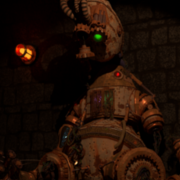I'm going to have to admit this is my first post here. I am an educator interested in Serious Educational Games (SEGs) and the last time I had any involvement in coding was over 10 years ago during a Computer Programming summer camp I went to as a highschool student. (Wow, that tells you a lot about me...) I'm coming to this forum because I have no idea where to even start learning / reaching out to experts and I was hoping someone here could point me in the right direction.
I have an idea for a puzzle game that would be similiar to a physics puzzle game (Angry Birds, Crayon Physics Deluxe, The Incredible Machine, etc.) but instead of being based on physics principles, it would be based more on biochemistry principles. (e.g. Foldit http://fold.it ). Except it wouldn't be a biochemistry puzzle game like Foldit is, but rather a Molecular Biology Puzzle Game. For want of a better metaphor, Foldit is to me as a molecular biologist what Brownian motion is to a Physics game engine. Extremely important but a logistical nightmare.
In the process of creating this game, I am ALSO interested in creating a piece of programing that would allow future programers to plug the piece of programing into future programs, like a Physics Engine, only for Molecular Biology. That way, future SEG programmers could simply reuse the Molecular Biology aspect in other contexts. However, I'm beginning to think that, as I read, creating a library that could be integrated into (is compatable with?) a Physics Engine that is already out there might be more appropriate. Thoughts? Suggestions of questions I should be asking myself?
The other thing that I need a little direction on is what sort of information is needed for the programming process. Accurate protein folding / protein-protein interaction based on realistic calculations requires massive amounts of computing power ( hence things like http://folding.stanford.edu/ ). Obviously this will not work for a simple puzzle game designed for your iphone. Therefore, these calculations either need to be made much more simple, or converted into a rule based system of interaction (for instance, if X bumps into Y, Y is activated). An example of the sorts of interactions I'm talking about:
Thanks!









